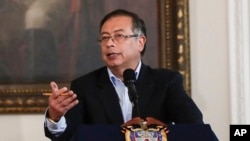Addressing the U.N. Security Council for the first time, a former Colombian rebel leader who now heads a political party urged the country's remaining armed groups Thursday to recognize left-wing President Gustavo Petro's government as "democratic and progressive" and to stop fighting against it.
Rodrigo Londono accused Petro's right-wing predecessor, Ivan Duque, of failing to implement the 2016 peace agreement with his rebel group, the leftist Revolutionary Armed Forces of Colombia, known as the FARC. That accord was aimed at ending more than 50 years of war in Colombia that caused more than 220,000 deaths and displaced nearly 6 million people.
But Londono told the council in a video briefing that Petro's electoral victory in 2022 brought in a progressive government committed to "political and social transformations," including comprehensively implementing the peace agreement.
"We trust his word, and we hope that his decisive action" will move implementation forward, he said.
Londono, who told ambassadors he joined the FARC as a 16-year-old in 1976 and was its last commander to sign the 2016 peace deal, said dissident FARC members who took up arms after the government failed to occupy regions abandoned by rebels who laid down their weapons represented "a miniscule percentage of those who first signed the agreement."
Peace talks ongoing
Londono said his party supports talks between Petro's government and the left-wing National Liberation Army rebel group, known as the ELN, plus the remaining dissident groups. The government and ELN both hailed progress at the end of a second round of peace talks last month in Mexico City.
Urging the armed groups not to fight against Petro's progressive efforts and his "total peace policy," Londono said a cease-fire should be something "that these organizations should embrace."
He criticized the Duque government for failing to significantly reduce rural poverty and for distributing just 251,122 hectares of the 3 million hectares of land to be put in a land fund under the peace agreement for distribution to poor people in rural areas. He also faulted Duque's government for failing to provide adequate security for former FARC members as well as adequate education and health care.
Londono, who was the target of an assassination attempt, said Petro faces huge challenges in implementing the peace agreement, "especially in the face of certain sectors and parties from the previous government who are intent on preventing even minimal transformations in favor of the people."
Had it not been for the support from the international community, especially the United Nations and the Security Council, which authorized a mission to monitor implementation of the peace agreement at the request of the Colombian government, "the attempt to find a political solution with us would have failed," he said.
Londono said his supporters were participating in the Security Council meeting Thursday "with great hope" that it would strongly support Petro's aim of fully implementing the 2016 peace agreement, which "will have a multiplying effect."
'Testimony of the commitment'
The U.N. special envoy for Colombia, Carlos Ruiz Massieu, told the council he was "honored" to be in Londono's presence, saying, "His leadership in the transition from war to peace has been and will continue to be fundamental."
"His participation today is certainly testimony of the commitment of thousands of former combatants to the final peace agreement," he said.
Ruiz also pointed to a recent meeting between Petro and Londono in Bogota and their joint visit to a former area for training and reintegration of former combatants "in the wake of a serious threat by an illegal armed group against dozens of former combatants."
In recent days, he said, the government has established an office headed by a high-level official in the presidency to look after the comprehensive implementation of the 2016 agreement — another example of its commitment.
Ruiz welcomed the government's negotiations with the ELN and another group of ex-FARC fighters and urged "all illegal armed actors not to waste the opportunity presented by the bold pursuit of peace through dialogue."
Colombian Foreign Minister Alvaro Leyva, who said he met Londono 30 years ago as a combatant, called the council meeting "truly a miracle," saying the former FARC leader not only helped draft and sign the peace agreement but also was now a member of a political party promoting its implementation.
The minister said it was especially meaningful for him to be at the Security Council "after several years where there was an attempt to put a brake on the agreement for national reconciliation signed between the Colombian state and the FARC."
Leyva said that Petro is trying to implement "total peace" not only within Colombia but also beyond its borders, and that it is hosting a conference in Bogota on April 25 with countries from Latin America, Europe, the United States and Canada "to see how we could resume the political dialogues."




